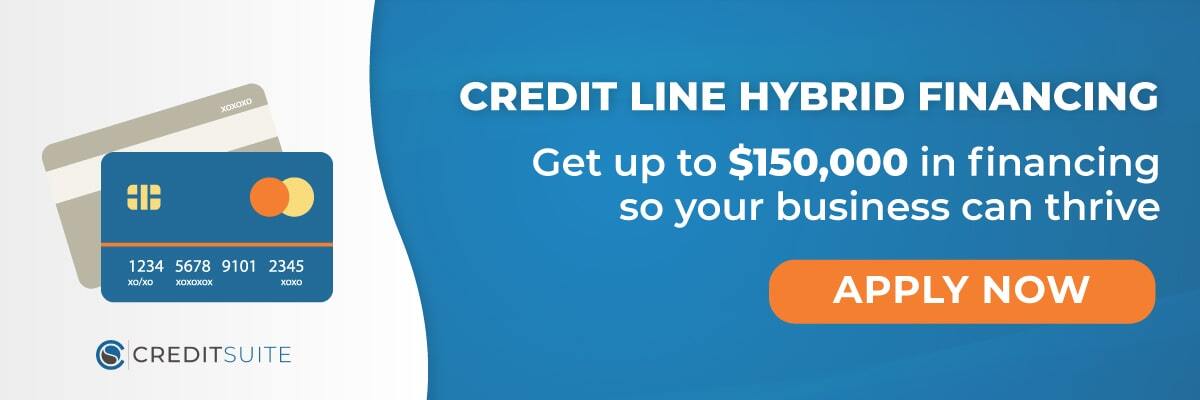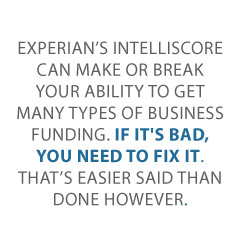Experian’s Intelliscore can make or break your ability to get many types of business funding. If it’s bad, you need to fix it. That’s easier said than done however.
Your Intellliscore is Important, but You Can Still Get Funding If It’s Bad
There are ways to improve your Intelliscore and get funding while you do so, but you need help. The time is now. Delaying can only make the issue worse. It helps to understand what your Intelliscore tells lenders about your business, and how Experian comes up with it.
Understanding Intelliscore
The Intelliscore Plus credit score is a statistically based credit-risk analysis. It helps businesses, investors and possible future lenders make smart choices about who they should do business with.
It runs from 1 to 100, and can deliver insight on how much of a risk a business or business owner may be.
The higher your score, the lower your risk class. The chart below summarizes each Intelliscore Plus credit score range and its associated meaning.
| Score Range |
Risk Class |
Risk Description |
| 76– 100 |
1 |
Low |
| 51– 75 |
2 |
Low to Medium |
| 26– 50 |
3 |
Medium |
| 11– 25 |
4 |
High to Medium |
| 1– 10 |
5 |
High |
Although there are more than 800 commercial and owner variables used to ascertain the score, the variables can be split into these pivotal factors:
Monetary
This specific factor focuses on how you use credit. For example, how much of your available credit is currently being used? Are you usines a lot of your credit and not repaying? Responsible credit use is a huge factor.

Credit Line Hybrid Financing: Get up to $150,000 in financing so your business can thrive.
Payment History
The bureaus call it recency. However, it’s just your current payment status. It’s basically how often any of your accounts become delinquent, the percent of accounts which are currently delinquent, and your overall trade balance.
Intelliscore Plus is considered to be one of the more reliable tools for determining creditworthiness. One of the ways it maintains this reputation is by identifying the key factors that indicate whether or not a business is likely to pay their debt.
Frequency
Somewhat closely related to payment history, frequency takes into account how often your accounts have been sent to collections, the amount of liens and judgments you may have, and any bankruptcies connected to your business or personal accounts.
On top of that, frequency can also incorporate details pertaining to your payment patterns. Were you regularly slow or late with payment? Did you start off paying bills late, but overtime, reduced this behavior? These things will all be taken into consideration.
If you haven’t started or don’t have a long history of business based transactions, how will Experian rate you?
This is addressed by using a blended model to identify your score. This means that they take your personal consumer credit score into account when calculating your business’s credit score.
What if You Have a Bad Intelliscore?
If it’s bad, you have to fix it. It’s that simple. However, it’s not as simple as it sounds. In fact, you may not be able to do it on your own. The best and fastest way to fix the issue is to start paying your obligations on time.
Of course that sounds simple. However, there is likely a reason you fell behind in the first place. The fact is, you need business funding to pay your bills and raise your score. But, how do you get funding without a good score? There is no one size fits all solution, but there are some things you can do.
Talk to a Business Credit Expert
If you are struggling with a bad score, you are going to need help. Not only help with rebuilding your score, but help with funding and fundability as a whole. Many business owners do not realize that business credit scores, like Intelliscore, are not the only thing lenders consider when it comes to business funding. There are a number of factors that must be taken into account, but the business credit scores, including Experian’s business credit score, are a big piece of the puzzle.
A business credit expert will help in more ways than one. First, they can help you find the best funding to fit your needs right now, that you can get even with a bad business credit score. Then, they can help you rebuild your business credit and evaluate your fundability overall, showing you how to make adjustments where necessary.
What Business Options Exist with Bad Credit?
Now is the time to talk to an expert, before your Intelliscore and other business credit scores get any worse. A business credit expert will likely suggest one of the following options to catch up on debt and start rebuilding your credit.

Credit Line Hybrid Financing: Get up to $150,000 in financing so your business can thrive.
Credit Line Hybrid
A credit line hybrid is unsecured business financing. It allows you to fund your business without putting up collateral, and you only pay back what you use.
Your personal credit score should be at least 680. In addition, you can’t have any liens, judgments, bankruptcies or late payments. Furthermore, in the past 6 months you should have less than 4 credit inquiries, and you should have less than a 45% balance on all business and personal credit cards.
Now, here’s the catch that helps a lot of business owners out. If you do not meet all of the requirements, you can take on a credit partner that meets each of these requirements. Many business owners work with a friend or relative to fund their business. If a relative or a friend meets all of these requirements, they can partner with you to allow you to tap into their credit to access funding.
The best part of this type of funding is that it reports to your business credit report, regardless of whether you use your personal credit to apply or that of a credit partner. That means, you get your funding and build your business credit at the same time.
If this still isn’t enough funding, or it won’t work for you, you may qualify for other options.
Account Receivable Financing
To get this type of funding, you have to have open receivables from another business or government agency, not individuals. In addition, you need to have been in business for at least one year. The minimum credit score is just 500.
You can get up to 80% of receivables advanced in as little as 24 hours.
Merchant Cash Advance
If you accept credit cards as payment, you may qualify for a merchant cash advance. You only need a credit score of at least 500. To qualify, your business must bring in $100,000 or more per year in credit card sales. Typical approval amounts equal one months’ credit processing volume. In addition to the application, you’ll need 3-6 months bank and merchant statements.
Equipment Financing
If you need equipment, it might be better to consider equipment financing. You will put up your existing equipment or the new equipment you want to purchase as collateral. Amounts are available up to $10 million with terms ranging up to 60 months. You will need a credit score of at least 550.
Real Estate Financing
You can get real estate financing in amounts up to $10 million with terms from 6 to 60 months and interest rates as low as 6%. You will need a 500 minimum credit score, and there are a few other requirements.

Credit Line Hybrid Financing: Get up to $150,000 in financing so your business can thrive.
Business Revenue Lending
Another option is business revenue lending. Again, the minimum credit score is 500. Your business must earn annual revenue of $120,000 or more, and it must do more than 5 small transactions each month. If your business brings in at least $15,000 monthly, then 6 months in business is acceptable. You will have to fill out an application and provide 6 months worth of bank statements.
Intelliscore, Business Funding, and Help for the Future
If your Intellicore is bad, you need help now. It will soon become impossible, if it isn’t already, to get the funding you need to run your business. An expert can help you come up with a plan to get your credit back on track, help you figure out what other issues you may have with fundability, and help you find funding you qualify for now to help you out in the meantime.
The post Understanding Experian’s Intelliscore and How An Expert Can Help appeared first on Credit Suite.





